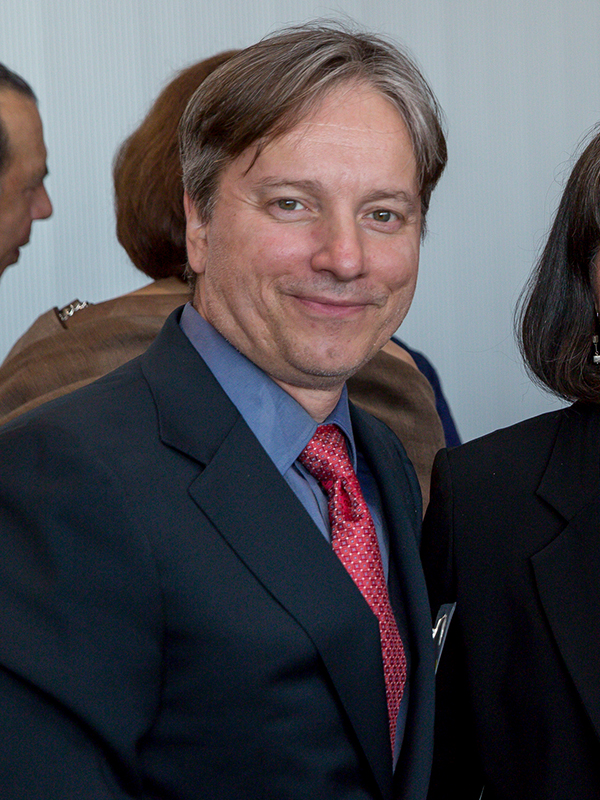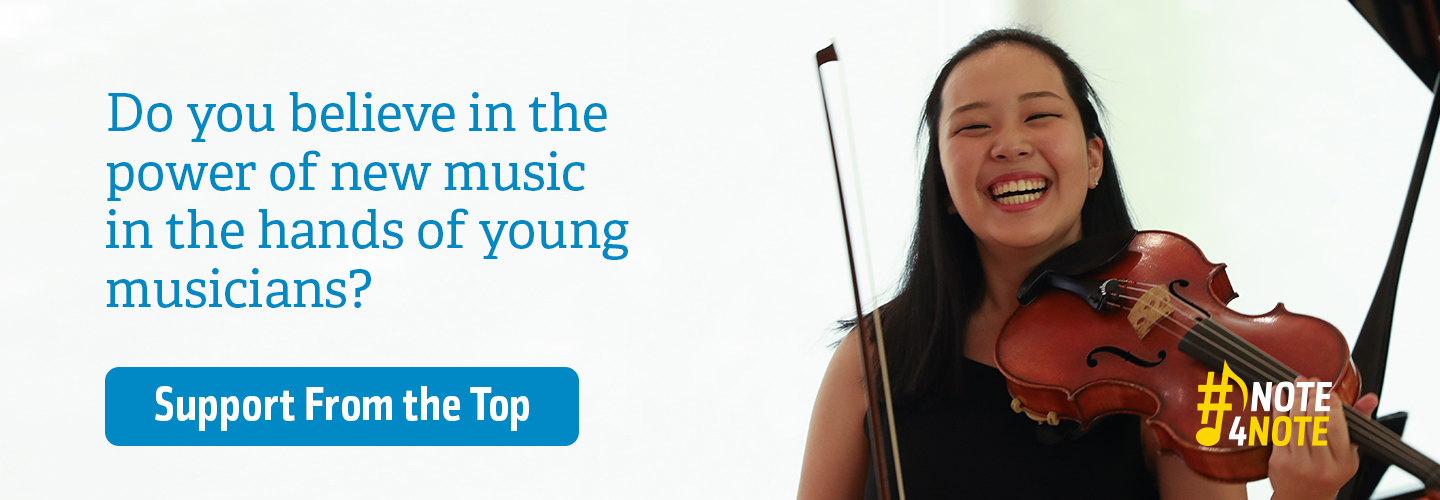Tom Vignieri, composer and former Music Director at From the Top
 Meet Tom Vignieri
Meet Tom Vignieri
Tom was From the Top’s Music Director for 12 years, and was our 2016 #Note4Note Campaign composer whose piece was premiered by pianist Theo Luu and violinist Chad Hoopes. You can watch the world-premiere here.
Now living in the beautiful countryside in the UK, we had the opportunity to speak with Tom while he was in Boston for a premiere of a new piece here in the states.
From where do you usually draw your inspiration while you’re composing, and does that source of inspiration change depending on the piece or project?
The inspiration is definitely on a project-to-project basis. There are the pieces you want to write and then there are pieces you’re asked to write. More times than not, it is the latter. It’s a happy thing to have someone want you to write a piece for them, but usually they have specific things they want.
I have this curious history of being asked to write big, celebratory pieces for big, celebratory occasions. I’m here in Boston this week for the 100th anniversary of the Melrose Symphony Orchestra and I’ve written them a piece to honor the occasion. Two years ago, I wrote a piece for the 75th anniversary of the Masterworks Chorale of Boston and, at the same time, the Handel and Haydn Society was celebrating their 200th anniversary and they asked me to do an arrangement for them.
When someone asks for a big piece you really try to do something that fits the occasion and that they’ll be happy with. Really, I just want to write intense and emotionally complex, personal pieces that nobody really wants to listen to.
Do you have a chance to get those intense and complex pieces out?
I look for opportunities to get those out in commissions. I’d say one out of every four or five will say, “We just want you to write whatever you want to write.” When that happens it’s a wonderful thing. I don’t mean to sound like I’m complaining, as a composer being asked to write a piece is a great privilege. In the instance of the Melrose Symphony Orchestra, I was given an enormous orchestra with all the bells and whistles. Auxiliary wind instruments, harps, organ, piano – you name it. At first, my reaction was “not a chance!” because if I write for an orchestra of that magnitude it will never get performed again. On the other hand, it’s an opportunity and so I took it. There will be at least one performance of this piece and it will be great fun!
Is that something you think about, whether or now the piece can be performed again?
I do, in the most basic way, I hope that it’s appealing enough that someone would like it enough to perform again. From the practical perspective, it has to be manageable. Everyone, from a professional orchestra to your neighborhood ensemble, has to weigh the costs and the practical considerations of mounting a production of the particular piece they’re interested in.
Maybe every few years they can pull their resources together and mount a blowout production and maybe your piece fits in that or maybe it does not. It’s better to write something that is a bit more traditional, a bit more manageable in terms of the orchestration and instrumentation. But ultimately it has to be something that is appealing as music.
That said, I’ve been very lucky in that the pieces I’ve been writing recently have lives. That’s very rare for that to be the case, it’s very rare for pieces to have a second performance and go on to have other performances after that. In the case of the piece being performed this weekend, I have interest from another orchestra in the Midwest, which is great.
You were talking a little about the importance of commissions, is there anything important regarding the concept of commissions or why they matter?
I think classical music in general, as it currently exists, tends to be a backward-looking phenomenon, slightly anachronistic. We look back over the last four or five centuries to the present, and for good reason. There’s so much incredible music from Mozart, Beethoven, and Brahms to Stravinsky, and there’s no way you could do it all in a single lifetime.
On the other hand, if the art form is to survive and thrive there has to be new music, we have to look forward. That is why it is vital that people take the risk to commission new pieces. It is exactly that, a risk, and it astounds me that anyone ever does it because – well, it reminds me of that line from Forest Gump, “Mom always told me life is like a box of chocolates, you never know what you’re gonna get.”
Very often a performing organization or an arts institution like From the Top will bravely ask someone to write a piece for them for very high profile occasions like #Note4Note. Without risk there is no reward. When you do something that is very exciting, very new and very fresh you can’t help but want to be a part of it and want to support it because it’s about the music, the creators of the music, the performers who bring it to life, the institution who had the vision to support it and in the end it’s about furthering the art form.
It is absolutely essential, which is why From the Top is so bloody important. You are really supporting the future of classical music in the most profound way. To give them a platform to do what these young artists are doing in front of a national audience and to give them the validation that what they are doing is important transcends music. Somebody who is given the gift of that confidence will make that work for them in whatever they choose to do in their life. It has a knock-on effect to our society and our culture, and is so desperately important for both of those things.
Can you tell us about your #Note4Note experience last year?
It was a marvelous and wonderful experience from the first phone call. It was one of those rare times where it seemed like a fit from the first instance. Right from the initial call I was hearing music in my head and I’m not one of those weird, clairvoyant types that just hears music. That doesn’t usually happen, certainly not for me.
On this occasion it just worked for me immediately, I had thoughts of what might be interesting and exciting to do. From the get-go it was already a win for me. To know I was writing for scary talented young artists who were going to perform it shaped the piece as well. I knew I could ask them to do anything up to asking them to do the impossible and they would play it like having a sandwich at lunch, it was no big deal. It was really fun and a real thrill.
For me personally, having spent 12 years as Music Director at From the Top, it was really interesting to be like a kid again, to be on the other side of the looking glass, and have that platform, have that voice. It was a fabulous experience from top to tail.
Do you have any tips for J.P. as he composes for this year’s campaign?
First of all, I remember him so clearly. It’s one thing to encounter a 13-year-old pianist or violinist who have such a masterful command of their instrument, but it’s another to encounter a 13-year-old composer who is writing in a mature style and is also writing the most delightful, evocative, moving music. That is a rare thing. I think people would be surprised to learn that there are lots of composers in the world, there always have been, but there are only a few good ones. Without a shred of doubt, J.P. Redmond is one of the good ones.
You don’t have to take my word for it; you can see the evidence for yourself. It’s one of the reasons why organizations need to be behind the work of wonderful young artists because we’re all going to be the beneficiaries of it. J.P. is going to give you something quite special and you’re going to be saying “Wow, that is amazing!”
So to answer your question, my advice for J.P. is that I’d like to get his phone number so I can get his perspective on a few things that I’ve written. That’s how I’m looking at it. It’s fantastic to be able to share that space with him.
Help J.P. finish his piece before #GivingTuesday on November 28. Please donate to the #Note4Note Campaign today.



